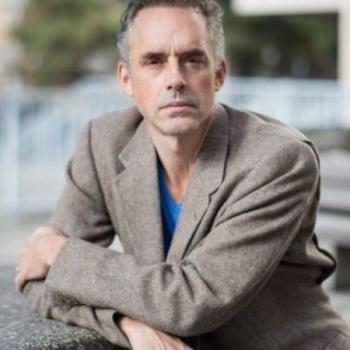It has often been said that the greatest apologetic for the truth of the Christian faith is the beauty of the Church and the lives of her saints. In this series, I am relating a personal account, the story of my recent heart attack, surgery and recovery. I do this as evidence of God and His Goodness. While there is always place for abstract arguments for God’s existence, and historical ones for the reality of Jesus Christ and the truth of His resurrection, sometimes personal testimony is the most powerful defense of all. That is not to say that my personal testimony is as such, and I only hope to be able to convey but a portion of what God is like in times of trial.
Still, the Bible itself tells us that evil is overcome in two ways: by the blood of the Lamb and by the testimony of those who have been washed in that blood (Revelation 12:7-12). And so there is a time and place where arguments end and it is appropriate to simply give testimony about Who God is and how He operates in our lives.
In the first post, I discussed why God allows suffering to come into the life of the believer, and how suffering is an opportunity for the Christian to both know God deeper and love one’s neighbor better. In the last post, I spoke about God’s people, His beautiful Church. To endure suffering without the people of God can be a real horror, and the Church is the spiritual family appointed and empowered by God to bring comfort and light into a dark world. In this post, I am going to talk about the beautiful mercies of God; how God “shows up” to bless us in the midst of great trials. But I am also going to speak about God’s enemies, and how they also show up, often at our weakest moments, to torment us.
The Glory of God Almighty
To experience the manifest glory of God, in the Hebrew God’s kavod, is the greatest possible thing that can happen to a finite and created creature like us. We read about God manifesting His glory–His weight, power, heaviness–in short, His reality, to the prophets and apostles. God’s glory envelops an entire mountain, demonstrating His reality to the newly exiled nation of Israel:
13 So Moses arose with his assistant Joshua and went up the mountain of God. 14 He told the elders, “Wait here for us until we return to you. Aaron and Hur are here with you. Whoever has a dispute should go to them.” 15 When Moses went up the mountain, the cloud covered it. 16 The glory of the Lord settled on Mount Sinai, and the cloud covered it for six days. On the seventh day He called to Moses from the cloud. 17 The appearance of the Lord’s glory to the Israelites was like a consuming fire on the mountaintop. 18 Moses entered the cloud as he went up the mountain, and he remained on the mountain 40 days and 40 nights.
God’s glory settles for a time in the tabernacle, so that Israel might worship Him (Exodus 40:38) and Moses longs to see but a glimpse of God’s glory (Exodus 33:18). The prophets receive visions of God’s glory, enabling them to speak truth to a corrupt kingdom of Israel and to hostile gentile nations:
In the year that King Uzziah died, I saw the Lord seated on a high and lofty throne, and His robe[a] filled the temple. 2 Seraphim[b] were standing above Him; each one had six wings: with two he covered his face, with two he covered his feet, and with two he flew. 3 And one called to another:
Holy, holy, holy is the Lord of Hosts;
His glory fills the whole earth.4 The foundations of the doorways shook at the sound of their voices, and the temple was filled with smoke.
Isa 6:1-4
Ezekiel has a vision of God’s glory that, we are told, is but the “appearance of the likeness” (ESV) of the Lord’s glory (Ezekiel 1:28), Yet when he sees it, he falls flat on his face from the sheer weight of the copy of the copy of the real thing. Peter, Jame and John, when the glory of God incarnate is revealed to them on the mount of Hermon, do the same in the presence of the Christ:
After six days Jesus took Peter, James, and his brother John and led them up on a high mountain by themselves. 2 He was transformed in front of them, and His face shone like the sun. Even His clothes became as white as the light. 3 Suddenly, Moses and Elijah appeared to them, talking with Him.
4 Then Peter said to Jesus, “Lord, it’s good for us to be here! If You want, I will make three tabernacles here: one for You, one for Moses, and one for Elijah.”
5 While he was still speaking, suddenly a bright cloud covered them, and a voice from the cloud said:
This is My beloved Son.
I take delight in Him.
Listen to Him!6 When the disciples heard it, they fell facedown and were terrified.
Matt 17:1-6
And so it is and has been in the life of millions upon millions who have, usually in the moment of their conversion, tasted the manifest glory of God. Chances are that anyone who reads this post and is not a Christian, has never had this experience. One can debate (Calvinist versus Arminian) whether such an experience of the manifest presence of God can be had and yet resisted.
From what I have gathered in my days, and admittedly limited research, anyone who has experienced God in this way cannot resist Him. They are Christians, at least for a while. Whether or not men or women who have known God directly like this can lose that initial faith is, of course, another topic of theological debate. However, for those who persevere, the direct vision of God almighty is what every true believer longs for, it is our final destination– our sole and ultimate end.
Waiting for Surgery & Revelations Of God
The night before my quadruple bypass, I lay in my hospital bed waiting. A smile reached across my face–from ear to ear. I sung/hummed a lowly hymn that I had learned earlier in the year with my men’s group. It went something like this:
He is able, more than able, to make me what He wants me to be…He is able, more than able….to do far more than I could ever dream, He is able…more than able…to accomplish what concerns me today…
I started laughing. Joy filled my soul. How wonderful I felt the night before my major surgery, in spite of all the tubes that now stuck in my veins, the drugs that pulsated through my body** and pending trial of the next morning. It was one of my happiest moments in recent years, in perhaps many years. Tears welled up in my eyes. I can only imagine what the nurses attending me were thinking.
Later, upon reflection, I was reminded of an excerpt from the diary of Sarah Edwards, the wife of the 18th century Puritan theologian, that seemed to speak of a similar experience of God’s presence and His beautiful mercies. After withdrawing one Wednesday afternoon in 1742 to her bedchambers, Sarah Edwards writes:
I cannot find language to express, how certain this appeared – the everlasting mountains and hills were but shadows to it. My safety, and happiness, and eternal enjoyment of God’s immutable love, seemed as durable and unchangeable as God himself. Melted and overcome by the sweetness of this assurance, I fell into a great flow of tears, and could not forbear weeping aloud. It appeared certain to me that God was my Father, and Christ my Lord and Savior, that he was mine and I his. Under a delightful sense of the immediate presence and love of God, these words seemed to come over and over in my mind, “My God, my all; my God, my all.” The presence of God was so near, and so real, that I seemed scarcely conscious of any thing else.
Sarah Edwards, Her Uncommon discoveries of the Divine Perfections and Glory; and of the Excellency of Christ
Indeed it is difficult to express the overwhelming, never-ending, and ever-so-sweet love of God. Tears, like Sarah Edwards, flowed down my cheeks as the present certainty of the future, ultimate aim of my soul was revealed to me. Also, like Edwards’s, the words that emerged from my lips were simple, not complex: “He is able…more than able…” And all other things, the hospital bed and the doctors, the nurses and the bi-hourly blood draws, my visitors, the people and things around me felt, for well over an hour, to be quite remote indeed, almost unreal in comparison to this utterly real God–mere shadows compared to the great “I AM.”
With one, small exception.
The Demon Next Door
One thing, and one thing only, seemed to encroach upon what God was doing in those glorious moments the evening before my surgery. As tears of joy streamed down my face, as I smiled from ear to ear, as I spoke with confidence to each nurse that came in, thanking them and blessing them in the Lord’s name, and as I gently hummed my simple hymn, I heard something emerge from the room right next to me. It was something rather profound. But, whatever it was, it was a quite unholy thing.
Again, skeptics will be skeptical at this point. I will answer objections as they come. But first, let me describe what I heard: the voice was almost not human. If it was a human’s voice (which it was, but perhaps more than that) it was a male voice. The sound of the voice is almost indescribable; words again fail to capture the full scope of what is a real, yet normally unseen, realm. Whatever the sound of the voice was like, it was worse than the howling of a dying animal. It was guttural, and far deeper than any voice I had heard in a long, long time. No one would desire to hear it. It was filled with blood and malice.
The voice didn’t say much, but what it did say was blasphemous, both of God and man. It went something like this (I will use symbols where needed, and let the imagination fill in the blank):
Help me! God-D@#$ Help me! You Mother-F’ers help me! F@#$ You! F@#$ You, You Mother-F’ers! Help me, Help me! Ahhh, God-Dammit, Help Me! F- YOU!, F-YOU all! Your trying to kill me! Help Me, Help me! Help me God-Dammit! God-Dammit! God-F’ing-Dammit! Help me!
There was little variation to the speech. These were the only words that came from the voice in the other room. Repeatedly they came, louder, then softer, then very loud indeed. Over and over and over again. For several hours. I listened, and I prayed.
I saw nurses emerge from the room in the light of the hallway. They were exasperated beyond their capacity. I heard one nurse, who had been trying to draw blood, say quite clearly:
I am not going back in there. He keeps trying to grab me. I couldn’t stick him. It looks like a slasher film in there, there’s so much blood everywhere.
I heard another nurse call for restraints, and security walking in and out of the room. Again, for hours the frightful dirge continued. Several nurses who were attending me, came into my room shaking their head. I could sense their tension, even if I was at peace, simply recognizing that in the room next door was either a man possessed, or a man who was for the first time realizing the full weight of his sin, perhaps almost too late. Of course, it could have been both. I think it was both, given the content of the voice’s words, the manner in which they manifested and the terrorizing affect they were having on the hospital staff.
And so I am pretty convinced that as I lie on a bed of mercy, next door another lie on a bed of torment. I was not happy that there was such a man (and demon) in the room next door, but it came to me as just another fact about reality. This is how things really are, but we usually choose to ignore it. It was also not the first time I had been near a demonic presence.
Doesn’t the Bible tell us this is the case? If so, why don’t we believe it (even believers sometimes downplay it):
Then they came to the other side of the sea, to the region of the Gerasenes. 2 As soon as He got out of the boat, a man with an unclean spirit came out of the tombs and met Him. 3 He lived in the tombs. No one was able to restrain him anymore—even with chains— 4 because he often had been bound with shackles and chains, but had snapped off the chains and smashed the shackles. No one was strong enough to subdue him. 5 And always, night and day, he was crying out among the tombs and in the mountains and cutting himself with stones.
Mark 5:1-5
On two occasions I told two different nurses that what was going on in the room next door was not just physical. There was a man battling for his soul. I told the first nurse that they should call the chaplain or the priest (it was a Catholic hospital and they had both), if they really wanted to try to help the man. I told the second nurse that the man needed prayer, that his soul was in bondage, not just his body. Both agreed, unflinchingly. They were, after all, also seeing what was going on in the room next door. Although I did not see this man directly, the voice, the content of his speech and the reaction of the nurses were compelling. Torment is real-both in body and in spirit. Also, demons exist.
The reason we don’t believe is because we have inundated ourselves with a false worldview, a scientistic ideology that only tells half the truth about what is real. But I knew better, as did the nurses who were seeing the spiritual realm live and in color.
Of Saints and Salvation
That is not to say anything evaluative about me or this man. God is no respecter of persons; shining His grace on some, but not on others. Or, on another view, shining His grace on all, and permitting His creatures endowed with real freedom to reject that grace; perhaps up to and even after death. If God is not the author of evil, then it is us who freely choose to follow our own will and battle with sin, death and evil powers on our own terms.
The latter is my view, and I have written about “becoming evil” elsewhere. And I have recommended this book in an earlier post. In the end, is it really that hard to think that God might allow us to become the sin and evil we so dearly covet? But then, what kinds of things would we be? Of course, I also cannot say what happened to this man next door; perhaps that night was the very night of his salvation. I do not have the details to fill out that story.
For me, I can only praise God. He rescued me from sin, from death and from evil. Paul says in his letter to the Romans:
7 For none of us lives to himself, and no one dies to himself. 8 If we live, we live for the Lord; and if we die, we die for the Lord. Therefore, whether we live or die, we belong to the Lord. 9 Christ died and came to life for this: that He might rule over both the dead and the living.
Romans 14:7-9
This is the third, possibly fourth time I have come close to death in my life. The first two occurred on poorly planned mountain hikes, where nature almost got the best of me, in spite of my youth and vigor. The third came in Afghanistan; a story for another time. As I lay on my pre-op bed, considering death for the fourth time, Paul’s words did not come directly to my mind, but my deepest feelings in the moment were reflective of the meaning of his words.
Who cares if I live or die (and there are many on earth that do), either way I live or die to the Lord. At the same time, if God has work for one to do, then He will not take the saint before that work is done. And so, like Paul, I also knew that to live is to live not unto myself, but unto Christ and His people. The verse that ran most through my mind and heart throughout the time of my heart attack and surgery was this:
21 For me, living is Christ and dying is gain. 22 Now if I live on in the flesh, this means fruitful work for me; and I don’t know which one I should choose. 23 I am pressured by both. I have the desire to depart and be with Christ—which is far better— 24 but to remain in the flesh is more necessary for you. 25 Since I am persuaded of this, I know that I will remain and continue with all of you for your progress and joy in the faith, 26 so that, because of me, your confidence may growin Christ Jesus when I come to you again.
How can a man or woman have fear if they know upon death they will go home to be with God? Or, if they live, that God has an express purpose for extending their physical existence? Now, almost two weeks into my convalescence, I can say that the first is, in one sense much better for me, but I am happy to embrace the latter if God so wills it. There is work to be done.
In the next post I will talk about the difficulties in going from experiencing God to speaking about Him, as well as the nature of sharing in the sufferings of Christ.
*Preempting An Objection: An Apologetical Note
The skeptic could challenge at this point. “Well,” she might say, “what about those drugs? Perhaps that was the real source of your joy, the cause of your laughter?” Although I was only on a mild pain killer at the time of pre-op, I imagine it is true that all drugs of this sort provide some kind of pleasant mental state to their patients. Still, I recall that the drug I was on, was not even the stronger Morphine, which they had administered a few times (in small doses), the day before.
Also, even if the mind is put into a pleasurable state, a state of ease, to say that that is the cause of the mental content one experiences would be to commit a logical fallacy. Perhaps the drug only allowed me, or a part of my brain, to be more receptive to the content of this experience I was having–the experience still causally related to external powers.
Christians who study this area of neuroscience and philosophy of mind, have discerned that such experiences of God’s manifest presence cannot be naively reduced to entirely naturalistic causal explanations. Perhaps when Paul says in Romans that our minds need to be renewed, he is talking both of the mental and the physical realms, of our minds as well as our brains.
In fact, as the Bible shows us throughout, the experience of God being based on the nature of God, Who is the entirely free and personal God, is the best explanation for why we only experience God in very erratic ways. Just as a husband may wonder at the mysterious movements of an enigmatic wife, so too we might expect that if the real God is also a personal and radically free God, that He will not operate in some mechanistic, mathematical or predictable manner. That is not to say, however, that there are not things we can do to perhaps open ourselves up to the spiritual realm.
Studies have shown that prayer can alter our brain, opening us up to certain kinds of spiritual and emotional experiences. So too perhaps drugs. The use of drugs to place one into a “spiritual state” is not unusual in many folk religions. However, what those experiences will be like, to what one will open up the mind to, seems entirely independent of the drugs themselves. Perhaps, however, not so independent of the kinds of prayers beings said. In either case it would not necessarily be the drugs nor the prayers generating the experiences. At most, perhaps, they would be enhancing agents.
Since I have had a much more vivid experience of God in the past, while under totally normal physical and emotional conditions, what was occurring on my hospital bed the night before my surgery did not seem all that shocking. Finally, I am not advocating for the use of drugs to induce spiritual experiences. Nor do I think prayer can force God to show up (again God is the radically free God, we are not). However, in sum, the idea that because some brain chemistry may have been slightly altered does not compel me for a moment to think that that alone is the sum total of the experience. Although I know my skeptical readers will desperately want to hold on to this as the total causal explanation. For a more academic treatment of religious experience, one should read William Alston’s article here.














